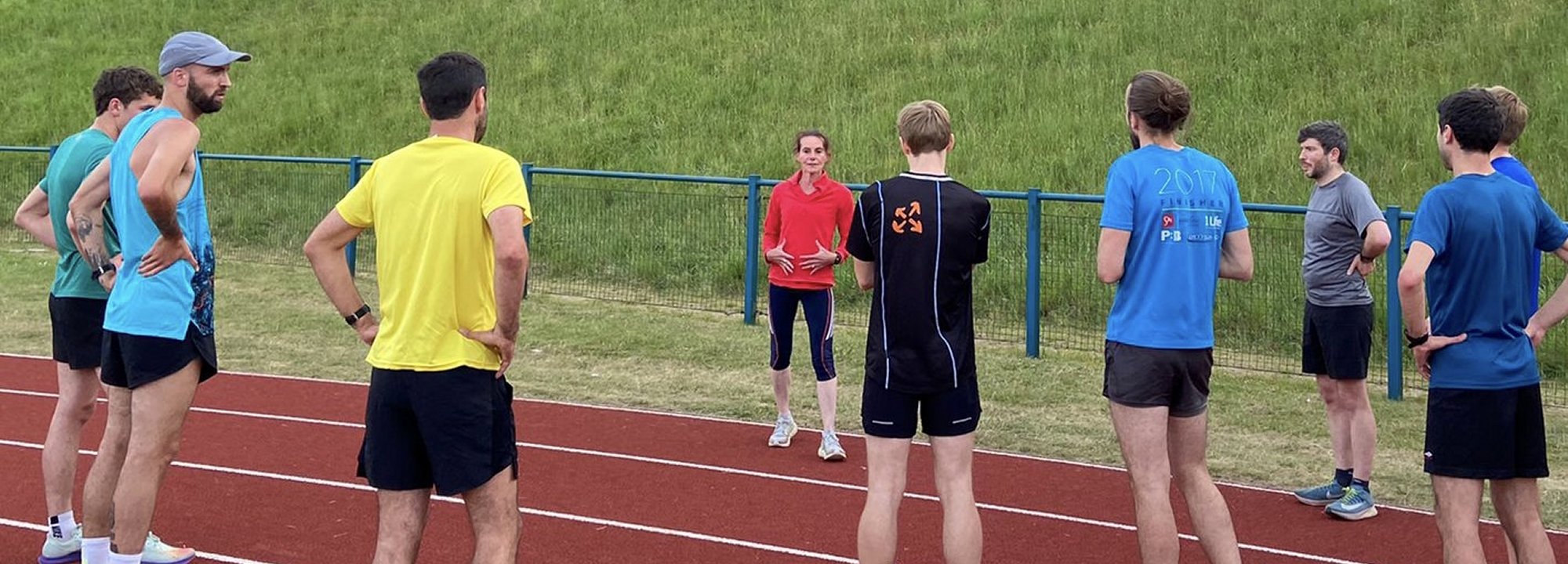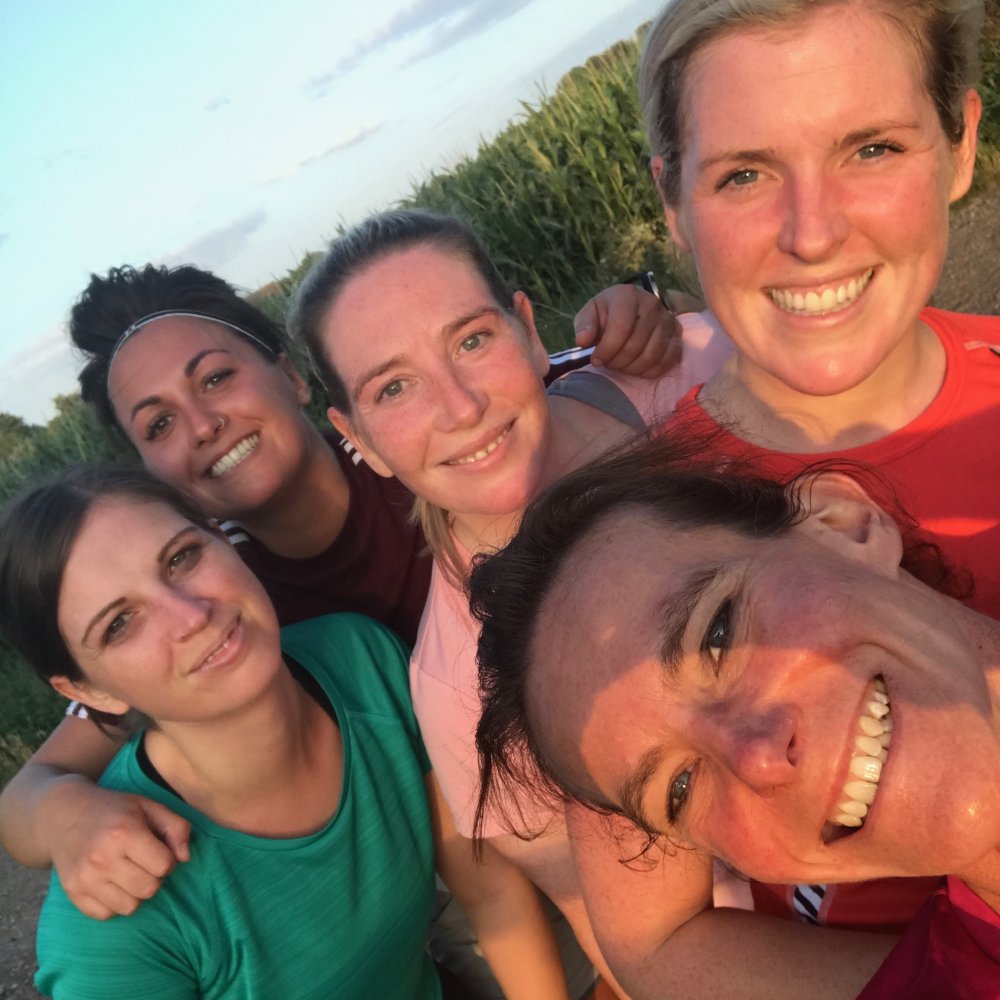Jo Wilkinson: from athlete to coach
Many followers of athletics may recognise the name Jo Wilkinson from her days as an England/Great Britain athlete.
She finished sixth in the 10,000m at the Commonwealth Games in Manchester, 53rd at the World Cross Country Championships and 23rd at the European Marathon Championships.
Jo’s stories from her days as an elite athlete would have provided enough content to produce a great case study. But this article is about her coaching journey, how she made the move into coaching, what she loves about being a coach and what others can do if they are looking to get more involved.
Jo’s coaching journey wasn’t as planned or as straight forward as you might think. In fact, speaking with England Athletics she said she ‘fell into coaching.’
Whilst Jo’s husband had told her for years that she should consider coaching, she had never actually entertained the idea because of the time commitment to her own running programme. It was only when a friend of hers was taking a Run Leader course at the local leisure centre, that Jo was persuaded to take her first steps towards being a coach.
“I had a great day and really enjoyed the course,” she said. “I came back and then felt inspired to set up a low key RunTogether group. My husband is in the military, and we were living in a military unit at the time, so I set up a RunTogether group for the wives on the patch. I did that and then, as is the case with the military, we moved house. It was a bit like a curse after that because I would set up another group and then we’d move again.”

Jo’s coaching eventually came to a stop as it was challenging to set up a group only to move away. She was also trying to get back into elite running. Sadly, her comeback was cut short with a serious injury. But as is the phrase ‘when one door closes, another one opens,’ three days after Jo injured herself, an email popped into her inbox from UK Athletics inviting her on an ‘elite athlete to coach’ course. As was the case with the Run Leader course, Jo thoroughly enjoyed the programme and her coaching career began once more, this time with Watford Harriers.
Getting the most out of coaching
Jo describes herself as a methodical person and loves the planning and problem solving that comes with coaching. She loves taking an athlete from A to B and sharing the highs that come with good training sessions and great results. But she also loves the science and physiology behind coaching and explained how coaching further enhanced the knowledge she gained as an athlete.
“I just enjoyed the new perspective. I was relatively successful as a runner going to the Commonwealth Games, European Championships, and things like that. Plus, I had been running for 30 years. So, I knew a lot about running and being an athlete, but coaching gave me a whole new framework for understanding why I did what I did and why it worked. I knew certain things worked but I could never tell you why. I loved that coaching scaffolded all the practical knowledge I had built up over the years.”
 Jo then spoke briefly about her coaching style. She believes a positive and encouraging attitude is the best way to get the most out of the athletes whilst making sure they are happy and enjoying themselves.
Jo then spoke briefly about her coaching style. She believes a positive and encouraging attitude is the best way to get the most out of the athletes whilst making sure they are happy and enjoying themselves.
“I think a holistic approach is very important,” she added. “Looking at the athlete as a whole and giving them a chance to feed into their own training. Being collaborative is important, especially if athletes are trying to juggle a full-time job and family commitment alongside their training.”
Adapting for the modern life
Jo talked about how the role of a coach has evolved over the years saying that technology now plays a big part. Most of Jo’s coaching is remote now as she moves around so much. Initially, she was worried about how close she would feel to the athletes, but this concern quickly faded, and she feels just as invested in her online coaching as she used to with face-to-face. She explains how technology allows people to adapt to a busy lifestyle and thinks this approach should also be adopted in training.
“You can stick to a very traditional model of a steady run on a Monday, session on a Tuesday etc but I just don’t really think that matches people’s lives,” she said. “I have found some of my athletes like routine and that is great, but I think having a rigid timetable just for the sake of it is not beneficial or practical. Being able to adapt training for each person daily, weekly, and monthly is really important. Everyone is an individual and you need to be able to adapt for different needs.”
Coaching with England Athletics

For the past few years, Jo has been the England Athletics Regional Coach Lead for Endurance in the South East as well as the Talent Event Lead coach on the England Athletics Youth and Junior Talent Programmes. Jo talks about the importance of both these programmes and how they help current and aspiring athletes to progress along the talent pathway.
“It’s been very rewarding to support other new and developing coaches in my role as Regional Coach Lead and inspiring to work with young athletes as they start out on their athletics journey.”
For the future stars of coaching
Jo explained how she encourages everybody to get into coaching or to at least learn about it because of the understanding it gives you. Jo wishes she knew all the things she knows now as a coach when she was running.

She also explained how just taking a coaching course will improve your own performance. For those just starting on the coaching pathway or already looking to get involved, Jo also had some advice.
“Take every opportunity and talk to as many different coaches as you can. Just go out there and try and practice. When I started coaching, I was very upfront and said, ‘I have no idea about coaching, but will you come on this journey with me?’ The more you practice, the better coach you become. I found people were generally quite willing to give it a go and we learnt together. There are some people I am really grateful to as we really did learn together. I’ve never looked back since.”
Women in coaching
Jo is certainly a role model when it comes to other athletes and coaches, particularly females. But following in Jo’s footsteps isn’t always easy for women. She spoke about the need for more female coaches in the sport and some of the potential barriers that may prevent women from getting more involved.
“Whilst childcare is an issue for everyone, it can be a real blocker for some women who are looking to get into coaching. Especially as a lot of training is between 5pm to 8pm which is often bedtime for children. So, make sure you have enough money for childcare or a really supportive partner who will look after the kids whilst you’re coaching.”
“I think women also suffer with a lack of confidence at times. Especially if you are the only woman in the group. I always find taking a deep breath and acting confident can help, even if I don’t necessarily feel it at the time.”
Jo tries to work with other female coaches where she can, to build a network and provide a support group for anyone finding it tough. Jo was keen to add that there are a lot of male coaches out there who are amazing and she herself has been very supported by male coaches. But it’s finding the balance when it comes to support for female coaches.
Looking to the future
 Jo has fond memories of a home Commonwealth Games having come sixth at Manchester in 2002, a performance she considers to be her major breakthrough. She spoke positively as she looked ahead to the home Games in Birmingham.
Jo has fond memories of a home Commonwealth Games having come sixth at Manchester in 2002, a performance she considers to be her major breakthrough. She spoke positively as she looked ahead to the home Games in Birmingham.
“A home Games generates such enthusiasm and positivity. For me personally, the Commonwealth Games was a real breakthrough and I think for athletes generally, the Commonwealth Games are often a steppingstone onto other major championships. To compete in front of a home crowd, is the most incredible experience. I remember feeling like David Beckham or whoever the most popular English footballer is these days when I stepped out into the stadium for the first time. I think the Games are also something that’s hopefully attainable for many athletes.”
Jo also explained how being a spectator is really inspirational and can lift the morale of the public.
“Hopefully, lots of people have tickets and will get to experience the atmosphere inside the stadium. The noise, the support, the action, it’s just a great day out for anyone. And the new Alexander Stadium just looks the business. When a city embraces the Games, as Birmingham is doing, it creates a positive and vibrant environment for all. I just hope the British weather behaves itself.”
Get involved
Jo was clearly a very talented athlete and is now making her mark as a coach. Despite ‘falling into coaching’ she has developed a passion for the role and hasn’t looked back since attending a Run Leader course at her local leisure centre. We’re thankful to Jo for sharing her experience and for shining a spotlight on the benefits and enjoyment that can be gained from being a coach as well as an athlete or runner.
If Jo has inspired you to learn more about coaching and how you can get involved, you can find out more on our coaching page. Click here to see the latest stories, courses, and updates.